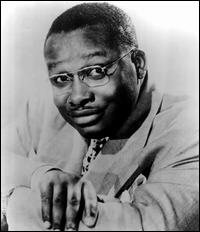 Born in Guthrie, Oklahoma in 1915, Joe Liggins was an accomplished pianist, arranger and vocalist by the time his was twenty years old. He moved to Los Angeles in 1939 and played with various musical groups, to include Sammy Franklin’s California Rhythm Rascals. Unable to convince Franklin to record a song he had written called “The Honeydripper”, Liggins formed his own band, “Joe Liggins and the Honeydrippers”.
Born in Guthrie, Oklahoma in 1915, Joe Liggins was an accomplished pianist, arranger and vocalist by the time his was twenty years old. He moved to Los Angeles in 1939 and played with various musical groups, to include Sammy Franklin’s California Rhythm Rascals. Unable to convince Franklin to record a song he had written called “The Honeydripper”, Liggins formed his own band, “Joe Liggins and the Honeydrippers”.
Between 1945 and 1948, Liggins had ten hits with Los Angeles based Exclusive Records, a black-owned R&B Independent Label. This included “The Honeydripper”, released in 1945 with reportedly two millions copies sold; and “I’ve Got a Right to Cry”, which sold 1.8 million copies.
Exclusive Records encountered financial difficulties in 1949 and Liggins moved to Specialty Records, also based in Los Angeles. For the next three years, Joe Liggins had several hit records with the Specialty label, in addition to playing to packed houses on the dance and show circuit throughout the U.S.
By 1954-55, changing times, fickle public tastes and the on-set of rock and roll led to a decline in Liggins’ record sales, bookings and popularity. Like many of the pioneering jump blues and early R&B artists that paved the way for rock and roll, the new rock and roll audience of teenagers related to younger performers. To this audience, the jump blues and R&B music of the 1940’s/50’s seemed old and dated.
By 1956, rock and roll was the music of teenage America, dominated by Elvis Presley, with county, rockabilly and doo wop vocals fighting for the remaining shares. Few people were interested in the 1940’s/50’s jump blues and R&B music that made much of rock and roll possible.
In the mid 1980’s, Joe Liggins’ music came back into fashion and he once again attracted attention, appreciation and bookings on the Blues and Jazz festival circuit. He led a band from then until his death in 1987 in Lynnwood, CA.
Some of Joe Liggins’ great songs include: “The Honeydripper”; “Rag Mop”; “Whiskey, Women, and Loaded Dice”; and “Freight Train Blues”.